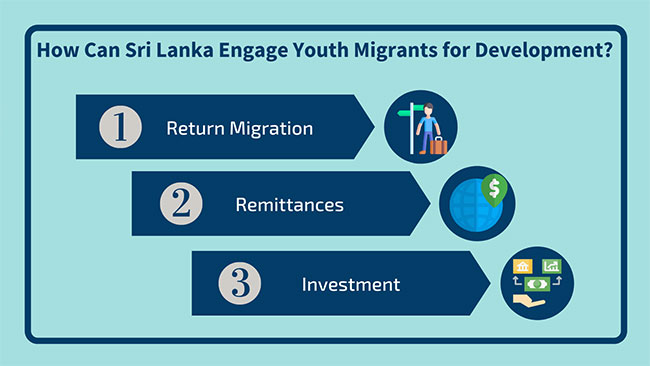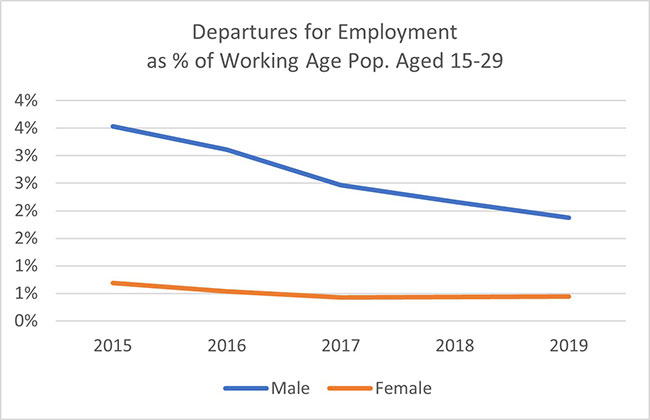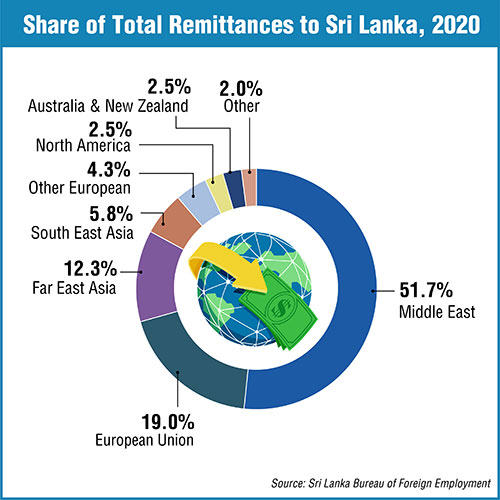Business
Youth migration: Challenges and opportunities for Sri Lanka

By Thisuri Ekanayake
 A great deal of discussion is underway on what appears to be the latest wave of migration from Sri Lanka. These conversations focus on the desire of young people to migrate in search of greener pastures in the face of the soaring cost of living and uncertainty about the country’s future. While the exact scale and nature of youth migration remain unclear, the costs of brain drain dominate these discussions. The brain drain concern is valid, yet focusing on it alone can limit our understanding of the complex implications of migration. This blog argues that apart from its challenges, youth migration can also present some surprising opportunities for socio-economic development if strategically managed.
A great deal of discussion is underway on what appears to be the latest wave of migration from Sri Lanka. These conversations focus on the desire of young people to migrate in search of greener pastures in the face of the soaring cost of living and uncertainty about the country’s future. While the exact scale and nature of youth migration remain unclear, the costs of brain drain dominate these discussions. The brain drain concern is valid, yet focusing on it alone can limit our understanding of the complex implications of migration. This blog argues that apart from its challenges, youth migration can also present some surprising opportunities for socio-economic development if strategically managed.
Youth Migrants
According to the latest Social and Economic Statistics and the Labour Force Surveys of Sri Lanka, departures for foreign employment among young people aged 15-29 years in relation to their population has not seen a noticeable rise in the recent past.
While it can be argued that the perceived increase in migration is a more recent phenomenon accentuated by the pandemic in 2020, it is also possible that young people depart more frequently for other pursuits such as education, for which statistics are not publicly available. To further complicate matters, it is unclear whether most youth consider education as a pathway for long-term residence abroad or intend to return to Sri Lanka with their acquired qualifications.
An Opinion Tracker Survey carried out by the Institute of Health Policy provides a clearer answer. This survey suggested that youth aged 18-29 have the highest desire to migrate at around 48%. But it was people in areas such as the Western province who indicated greater capability of preparing for migration. This is likely due to the high initial cost including airfare, tuition fees, and initial living expenses. Departures in categories other than short-term employment, therefore, seem to be mainly associated with high and middle-income groups. One frequently discussed implication of this is brain drain or the emigration of highly knowledgeable people. Out-migration can also affect economic growth as these social segments provide a stable source of demand for goods and services and contribute to investments. Beyond economic impacts, such communities also hold significant socio-political power in the country. Although understanding the full extent of the desire of young people to migrate remains difficult due to the lack of comprehensive data, a more strategic approach is still warranted to mitigate the adverse effects of migration and leverage its unique advantages.
Youth Migration and Development
Return Migration
 As human capital is one of the most valuable resources in Sri Lanka, brain drain can be detrimental. Conversely, return-migration of those who have acquired greater knowledge and skills would increase the stock of human capital. However, the challenges of absorbing returning youth must also be acknowledged, since there can be a mismatch in acquired skills, expectations, and the existing labour market demand. Aside from this, a high unemployment rate (26.5%) among those aged 15-24 years is already prevalent in the country. As such, it is necessary to create more opportunities for youth especially in areas such as science and technology which have a potential for growth and innovation, and also facilitate a conducive business environment and financial system so that knowledge and skills can be utilised in a productive, profitable manner.
As human capital is one of the most valuable resources in Sri Lanka, brain drain can be detrimental. Conversely, return-migration of those who have acquired greater knowledge and skills would increase the stock of human capital. However, the challenges of absorbing returning youth must also be acknowledged, since there can be a mismatch in acquired skills, expectations, and the existing labour market demand. Aside from this, a high unemployment rate (26.5%) among those aged 15-24 years is already prevalent in the country. As such, it is necessary to create more opportunities for youth especially in areas such as science and technology which have a potential for growth and innovation, and also facilitate a conducive business environment and financial system so that knowledge and skills can be utilised in a productive, profitable manner.
Remittances
Migration and remittances have been widely discussed in relation to the current foreign exchange shortage in the country. Although there is some difficulty in estimating the remittances by the youth alone due to data availability, the Sri Lanka Foreign Employment Bureau finds that in 2020, the overall highest contributions originated from areas such as the Middle East (51.7%) and the European Union (19%) whereas destinations such as North America or Australia and New Zealand only account for 2.5% of the total remittances each. This can be expected as many who depart to the former regions are temporary workers regularly remitting to support their families and livelihoods in Sri Lanka.
There is some potential then, to improve flows from the latter regions with sizable communities of Sri Lankans or those of Sri Lankan origin. Proactive engagement of young people can be carried out especially through networks such as school or university alumni associations, voluntary groups, and educational institutions in collaboration with government and non-government bodies.
Investment
 As a somewhat risk-averse society, investment and entrepreneurship in Sri Lanka tend to suffer, especially among the youth. But this is understandable given the volatile economic conditions, relatively poor business environment (99th position in the Ease of Doing Business Index in 2020), limited capital, and negative societal attitudes. Conversely, youth from diaspora communities, once securely established are likely to have greater access to capital and may also be less risk-averse due to their exposure to new norms and attitudes.
As a somewhat risk-averse society, investment and entrepreneurship in Sri Lanka tend to suffer, especially among the youth. But this is understandable given the volatile economic conditions, relatively poor business environment (99th position in the Ease of Doing Business Index in 2020), limited capital, and negative societal attitudes. Conversely, youth from diaspora communities, once securely established are likely to have greater access to capital and may also be less risk-averse due to their exposure to new norms and attitudes.
Another benefit of connecting with expatriate communities is that they tend to be mutually interested in maintaining ties with their country of origin due to various reasons including economic opportunities, a desire to support family and friends and even to contribute towards national development. Identifying and communicating opportunities, as well as facilitating ventures through simpler processes and incentives are some measures that can be taken to achieve this win-win outcome.
In short, while some young people have recently shown a greater desire to migrate, this scenario presents both challenges as well as opportunities. Young migrants residing abroad maintain a significant potential to contribute to Sri Lanka’s development if they are proactively engaged. However, such initiatives should be carried out with caution since false commitments and major inconveniences can dishearten and discourage migrant communities from further attempts at maintaining ties with their motherland.
Link to the full Talking Economics Blog: https://www.ips.lk/talkingeconomics/2022/02/07/youth-migration-challenges-and-opportunities-for-sri-lanka/
Thisuri is a Research Assistant working on migration and urbanisation policy research at IPS. She holds a BA (Honours) in Economics from the University of Colombo. Thisuri participated in the 2020 IMF Fund Challenge and was selected to present a paper at the FISU World Conference on Innovation, Education and Sport in Lucerne, Switzerland. As an undergraduate, Thisuri received a scholarship for obtaining the best results in the first-year examination of the Faculty of Arts. (Talk with Thisuri: thisuri@ips.lk)
Business
AHK Sri Lanka champions first-ever Sri Lankan delegation at Drupa 2024

The Delegation of German Industry and Commerce in Sri Lanka (AHK Sri Lanka) proudly facilitated the first-ever Sri Lankan delegation’s participation at Drupa 2024, the world’s largest trade fair for the printing industry and technology. Held after an eight-year hiatus, Drupa 2024 was a landmark event, marking significant advancements and opportunities in the global printing industry.
AHK Sri Lanka played a pivotal role in organising and supporting the delegation, which comprised 17 members from the Sri Lanka Association for Printers (SLAP), representing eight companies from the commercial, newspaper, stationery printing, and packaging industries. This pioneering effort by AHK Sri Lanka not only showcased the diverse capabilities of Sri Lanka’s printing sector but also facilitated vital bilateral discussions with key stakeholders from the German printing industry.
Business
Unveiling Ayugiri: Browns Hotels & Resorts sets the stage for a new era in luxury Ayurveda Wellness

In a captivating reimagining of luxury wellness tourism, Browns Hotels & Resorts proudly unveiled the exquisite Ayugiri Ayurveda Wellness Resort Sigiriya. This momentous occasion, celebrated amidst a vibrant and serene grand opening on the 6th of June, heralds a new chapter in the Ayurveda wellness tourism landscape in Sri Lanka. Nestled amidst 54 acres of unspoiled natural splendour, Ayugiri features 22 exclusive suites and stands out as the only luxury Ayurveda wellness resort in the country offering plunge pools in every room, rendering it truly one-of-a-kind.
The grand opening of Ayugiri Ayurveda Wellness Resort was an enchanting event, where guests were captivated by the melodies of flutists and violinists resonating through Sigiriya’s lush landscapes. As traditional drummers and dancers infused the air with vibrant energy, Browns Hotels & Resorts’ CEO, Eksath Wijeratne, Kotaro Katsuki, Acting Ambassador for the Embassy of Japan and General Manager, Buwaneka Bandara, unveiled the resort’s new logo, marking a significant moment witnessed by distinguished guests from the French Embassy, Ayurveda and wellness enthusiasts along with officials from the Sigiriya area, LOLC Holdings and Browns Group.
“Our strategic expansion into wellness tourism with Ayugiri Ayurveda Wellness Resort Sigiriya symbolises a significant milestone for Browns Hotels & Resorts. Wellness tourism has consistently outperformed the overall tourism industry for over a decade, reflecting a growing global interest in travel that goes beyond leisure to offer rejuvenation and holistic well-being. By integrating the timeless wisdom of Ayurveda with modern luxury, we aim to set a new standard in luxury wellness tourism in Sri Lanka. Whether your goal is prevention, healing, or a deeper connection to inner harmony, Ayugiri offers a sanctuary for holistic well-being” stated Eksath Wijeratne.
Ayugiri encapsulates the essence of life, inspired by the lotus flower held by the graceful queens of the infamous Sigiriya frescoes. Just as the lotus emerges from the murky depths, untainted and serene,
Ayugiri invites guests on a journey of purity and rejuvenation, harmonised with a balance of mind, body and spirit, the essence of nature, echoes of culture and the wisdom of ancient Ayurvedic healing.
Business
HNB General Insurance recognized as Best General Bancassurance Provider in Sri Lanka 2024

HNB General Insurance, one of Sri Lanka’s leading general insurance providers, has been honored as the Best General Bancassurance Provider in Sri Lanka 2024 by the prestigious Global Banking and Finance Review – UK.
The esteemed accolade underscores HNB General Insurance’s unwavering commitment to excellence and its outstanding performance in the field of bancassurance. Through dedication and hard work, the HNB General Insurance team has continuously endeavored to deliver innovative insurance solutions, cultivate strong relationships with banking partners, and provide unparalleled service to customers nationwide. This recognition is a testament to the team’s dedication and relentless pursuit of excellence in the bancassurance business.
“We are honored to receive this prestigious award, which reflects our team’s tireless efforts and dedication to delivering value-added insurance solutions and exceptional service through our bancassurance partnerships,” said Sithumina Jayasundara, CEO of HNB General Insurance. “This recognition reaffirms our position as a trusted insurance provider in Sri Lanka and motivates us to continue striving for excellence in serving our customers and communities.”












